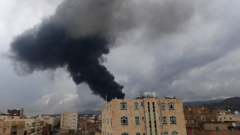The Integrated Food Security Phase Classification reports that a famine is present in Gaza, affecting approximately 500,000 people due to systematic obstruction of food aid by Israel amidst ongoing conflict. International responses highlight the humanitarian crisis and attempt to address the dire conditions faced by the Palestinian population.
Examining the Man-Made Famine in Gaza: A Deepening Crisis

Examining the Man-Made Famine in Gaza: A Deepening Crisis
A report reveals that worsening conditions in Gaza have led to famine, with accusations directed at Israel for obstructing vital food aid.
Famine conditions are reportedly spreading in Gaza, impacting a staggering 500,000 individuals, as revealed by the Integrated Food Security Phase Classification (IPC), a key hunger monitor endorsed by the United Nations. This dire situation is described as "entirely man-made," with allegations against Israel for systematically obstructing food entry into the area. Residents of Gaza are voicing distress, claiming that children have never tasted fruit due to the scarcity.
The IPC's findings indicate significant food insecurity, with alarming statistics: at least 20% of households are experiencing extreme food shortages, approximately one-third of children are severely malnourished, and daily mortality rates due to starvation or related health crises are at concerning levels. Although some data regarding mortality is not fully captured due to a breakdown in monitoring systems, expert evaluations suggest that famine thresholds have unmistakably been reached.
Despite the escalation of reports detailing hunger, Israeli Prime Minister Benjamin Netanyahu has consistently denied the existence of famine in Gaza, attributing hunger to the mismanagement of aid by organizations and Hamas itself. Israel claims that aid trucks remain idle at the border, and there are accusations regarding the misappropriation of supplies intended for those in need.
The blockade of goods entering Gaza has significantly worsened following the war ignited on October 7, 2023. Initial restrictions were tightened post-conflict, ultimately leading to a near-total blockade that lasted three months. Although some humanitarian aid began trickling in from May, a new system implemented by the Gaza Humanitarian Foundation has replaced the traditional UN-led distribution network, making access to food perilous for residents.
Palestinians are confronted with the grim realities of navigating militarized zones to reach food aid, often at the risk of being shot. The United Nations reports that numerous individuals have been killed while attempting to access aid, with continuous monitoring revealing that the vast majority of casualties are attributed to Israeli military actions.
While recently there has been a slight increase in the volume of aid entering Gaza—accompanied by "tactical pauses" in fighting to facilitate aid movement—many basic goods remain prohibitively expensive. Humanitarian organizations stress the need for a consistent influx of trucks to ensure the population's survival, but ongoing restrictions remain in place.
Responses from Israeli officials label IPC's findings as biased, asserting that the report is tailored to support Hamas's narrative. In contrast, the UN and humanitarian leaders emphasize Israel's international obligations to ensure the delivery of food and medical supplies, with severe criticisms directed toward the tactics employed in the blockade.
As military operations intensify, including the mobilization of reservists for an invasion of Gaza City, the situation jeopardizes the lives of one million Palestinians living in the affected areas. The potential evacuation of vulnerable populations is a growing concern for humanitarian organizations, who warn that military actions may lead to even graver consequences amid the existing famine crisis. Global calls for immediate escalations in aid delivery continue as the situation remains critical.

















